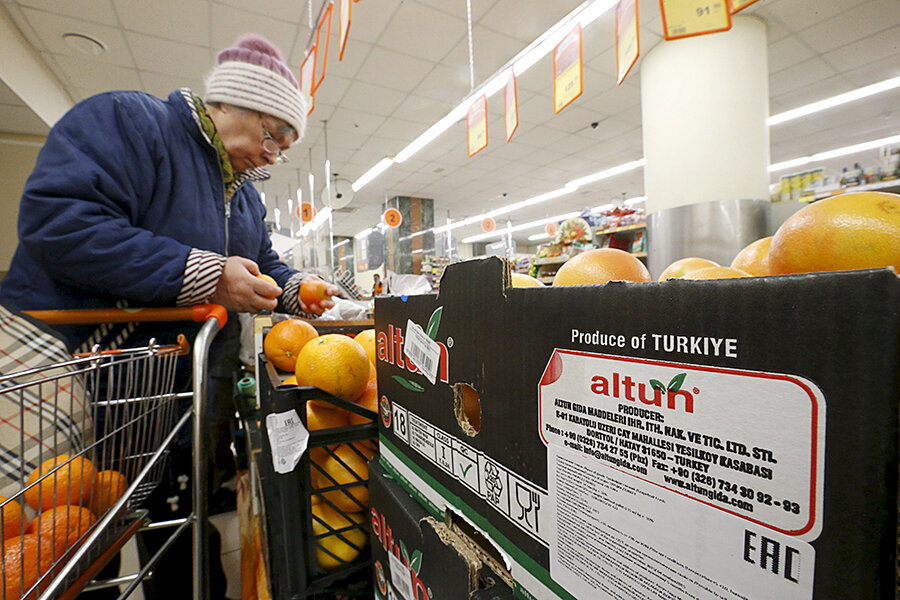Kremlin's beef with Turkey hits Russians at home – and on holiday
| Moscow
Barely a month ago, most Russians saw in Turkey a friendly country, a welcoming tourist destination, and an alternative for high-quality consumer goods amid a sanctions-related embargo on EU imports.
At the Antalya Group of 20 summit, Vladimir Putin went out of his way to praise Turkish leader Recep Tayyip Erdogan as an "open and straightforward" person. He insisted that relations were booming and there were even signs of "rapprochement" between them over Syria, where they back rival warring parties.
But that all changed with Turkey's downing of a Russian Su-24 bomber late last month, resulting in the deaths of two Russian servicemen.
Moscow abruptly broke with Ankara, which accused the bomber of violating Turkish airspace. Mr. Putin turned to white-hot rhetoric, using his annual state-of-the-nation address to accuse Turkey's leaders of being terrorist collaborators, back-stabbers, and hypocrites who had probably lost their minds.
And now, some Russians are feeling political whiplash and deepening uncertainty over the sudden, acrimonious split with an erstwhile friendly nation.
"It's hard to believe, but everything that was painstakingly built up over 25 years, all the political understandings and economic ties, have been pretty much wrecked in just the past three weeks," says Fyodor Lukyanov, editor of Russia in Global Affairs, a leading Moscow-based foreign policy journal. "It now looks like it was all just smoke."
Economic fallout
Putin pledged that the consequences for Turkey would transcend merely economic sanctions. But Russia did levy sweeping sanctions on imports of Turkish fruits, vegetables and clothing were slashed. Turkish businesspeople working in Russia, especially in the lucrative construction industry, were targeted by officials and in some cases expelled from the country. The cost to Turkey in lost exports and inbound tourist receipts may exceed $9 billion next year, a Turkish official said.
A year ago, Russia's natural gas monopoly, Gazprom announced a grand plan to build a pipeline under the Black Sea to Turkey as a transit route to southern Europe. That project is now now on hold; news reports say that Gazprom would be forced to abandon steel pipes worth almost $2 billion if it isn't revived.
Experts say the growing antagonisms are being fed by the personalities of Putin and Mr. Erdogan, who both pose as strong, righteous leaders who do not back down from a fight.
"Political motivations are overwhelmingly winning over economic logic," says Mr. Lukyanov. "The costs won't matter, they will carry this through to the end."
Still, Russians have already given up their favorite European products, and the new ban on Turkish foods may result in at least temporary shortages of many common fruits and vegetables, Russia's Ministry of Economic Development has warned.
"It's going to be difficult to get around these new bans," says Irina Koziy, director of Russia's online FruitNews agency. "Fifty percent of all tomatoes sold in Russia are from Turkey, and about a third of citrus fruits."
"There have already been disruptions due to the counter-sanctions against Europe, and we were relying on Turkey to fill the gap. Price increases will be the inevitable consequence of all this."
Holidays interrupted
Almost 4 million Russians visit Turkey annually, mostly on cheap package tours to its sunny Aegean and Mediterranean coasts. But in the wake of the Su-24 incident, Russia has banned charter flights to Turkey, and as of this week virtually all Russian group tours have stopped. That will hit not only Turkish hoteliers and tour operators hard, but also the multitude of shopkeepers who profit from free-spending Russian visitors.
But, with the New Year holiday looming, it also leaves most middle-income Russians short of winter sunshine escapes. Flights to Egypt, another popular budget destination, were suspended in October following the terrorist bombing of a Russian airliner over Sinai.
"There are alternatives, such as Thailand and Vietnam, but they are much more expensive," says Elena Pechalova, a travel expert in the Moscow office of TMI Consultancy. About 40 percent of Russian package tourists had opted for Egypt in winter and Turkey in summer. Russian alternatives, such as Crimea and Sochi, are much more expensive and offer nothing close to the levels of service.
"I think this New Year people will probably prefer to stay home and save money," she says. "In the longer run, people will probably have to spend more money, and go further" to get that beach holiday.
The head of Russia's state tourism agency, Oleg Safonov, tried to make lemonade out of those bitter prospects by suggesting it would be patriotic to just stay home. "This stereotype, the need for the beach and the sea, was in large part imposed [upon Russia] in recent years," he said. "Our ancestors, even the most affluent, did not travel en masse to foreign seashores."
Mr. Safonov's remarks were somewhat blunted when anti-corruption crusader Alexei Navalny published the official's 2014 income declaration – which listed two villas on the tropical Seychelles Islands among his properties.
Beyond the shortage of oranges and lack of holiday options, Russia's split with Turkey means that another country has joined the ranks of Russia's antagonists abroad.
"The impact of this new quarrel with Turkey is going to be bad," says Andrei Kolesnikov, an analyst with the Moscow Carnegie Center. "The language of hostility is spreading, encompassing first the US and Europe and now Turkey. Peoples' minds are gradually being poisoned against the world, as we all crowd into 'fortress Russia' and embrace our isolation."







